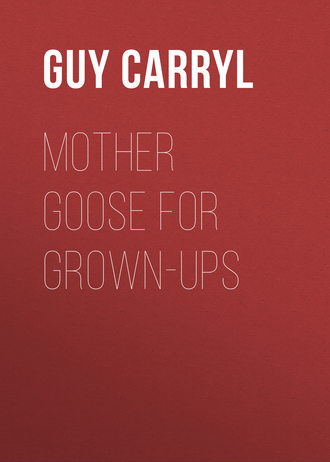Полная версия
Купить и скачать
Добавить В библиотеку
Настройки чтения
Размер шрифта
Высота строк
Поля
THE QUIXOTIC QUEST OF THREE BLIND MICE
A maiden mouse of an arrogant mindHad three little swains and all were blind.The reason for this I do not know,But I think it was love that made them so,For without demur they bowed to her,Though she treated them all with a high hauteur.She ruled them, schooled them, frequently fooled them,Snubbed, tormented, and ridiculed them:Mice as a rule are much like men,So they swallowed their pride and called again.The maiden mouse of an arrogant mindTo morbid romance was much inclined.The reason for this I have not learned,But I think by novels her head was turned.She said that the chap who dared to napOne hour inside of the farmer's trapMight gain her, reign her, wholly enchain her,Woo her, win her, and thence retain her!Hope ran high in each suitor's breast,And all determined to stand the test.The maiden mouse of an arrogant mindLaughed when she saw them thus confined.The reason for this I can't proclaim,But I know some girls who'd have done the same!As thus they kept to their word, and slept,The farmer's wife to the pantry stept:She sought them, caught them, carefully brought themOut to the light, and there she taught themHow that chivalry often fails,By calmly cutting off all their tails!The maiden mouse of an arrogant mindTreated her swains in a way unkind.The reason for this is not complex:That's always the way with the tender sex.With impudent hails she cried: "What ailsYou all, and where are your splendid tails?"She jeered so, sneered so, flouted and fleered so,Giggled, and altogether appeared soLacking in heart, that her slaves grew bored,And threw up the sponge of their own accord.The maiden mouse of an arrogant mindWatched and waited, and peaked and pined.The reason for this, I beg to state,Is all summed up in the words Too Late!The moral intwined is: Love is blind,But he never leaves all his wits behind:You may beat him, cheat him, often defeat him,Though he be true with torture treat him:One of these days you'll be bereft,You think you're right, but you'll find you're left.THE REMARKABLE REGIMEN OF THE SPRAT FAMILY
The Sprats were four in number,Including twins in kilts:All day Jack carted lumber,All day his wife made quilts.Thus heartlessly neglectedTwelve hours in twenty-four,As might have been expected,The twins sat on the floor:And all the buttons, I should state,They chanced to find, they promptly ate.This was not meat, but still it's trueWe did the same when we were two.The wife (whose name was Julia)Maintained an ample board,But one thing was peculiar,Lean meat she quite abhorred.Here also should be statedAnother fact: 'tis thatHer spouse abominatedThe very taste of fat.This contrast curious of tastePrecluded any thought of waste,For all they left of any mealNo self-respecting dog would steal.No generous table d'hôte meal,No dainties packed in tins,But only bowls of oatmealThey gave the wretched twins;And yet like princes pamperedHad lived those babes accursed,Could they have fed unhampered: —I have not told the worst!Since nothing from the dining-roomWas left to feed the cook and groom,It seems that these domestics cruelWere led to steal the children's gruel!The twins, all hopes resigning,And wounded to the core,Confined themselves to diningOn buttons off the floor.No passionate resentmentThe docile babes displayed:Each day in calm contentmentThree hearty meals they made.And daily Jack and Mrs. SpratAte all the lean and all the fat,And every day the groom and cookThe children's meal contrived to hook.But when the twins grew older,As twins are apt to do,And, shoulder touching shoulder,Sat Sundays in their pew.They saw no Christian gloryIn parting with a dime,And in the offertoryDropped buttons every time.Said they: "What's good enough for SpratsIs good enough for heathen brats."(I most sincerely wish I knewWhat was the heathen's point of view.)The moral: Anecdotes aboundOf buttons in collections found.Thus on the wheels of progress go,And heathens reap what Christians sew!THE SINGULAR SANGFROID OF BABY BUNTING
Bartholomew Benjamin BuntingHad only three passions in life,And one of the trio was hunting,The others his babe and his wife:And always, so rigid his habits,He frolicked at home until two,And then started hunting for rabbits,And hunted till fall of the dew.Belinda Bellonia Bunting,Thus widowed for half of the day,Her duty maternal confronting,With baby would patiently play.When thus was her energy wastedA patented food she'd dispense.(She had bought it the day that they pastedThe posters all over her fence.)But Bonaparte Buckingham Bunting,The infant thus blindly adored,Replied to her worship by grunting,Which showed he was brutally bored.'Twas little he cared for the troublesOf life. Like a crab on the sands,From his sweet little mouth he blew bubbles,And threatened the air with his hands.Bartholomew Benjamin BuntingOne night, as his wife let him in,Produced as the fruit of his huntingA cottontail's velvety skin,Which, seeing young Bonaparte wriggle,He gave him without a demur,And the babe with an aqueous giggleHe swallowed the whole of the fur!Belinda Bellonia BuntingBehaved like a consummate loon:Her offspring in frenzy confrontingShe screamed herself mottled maroon:She felt of his vertebræ spinal,Expecting he'd surely succumb,And gave him one vigorous, final,Hard prod in the pit of his tum.But Bonaparte Buckingham Bunting,At first but a trifle perplexed,By a change in his manner of gruntingSoon showed he was terribly vexed.He displayed not a sign of repentanceBut spoke, in a dignified tone,The only consecutive sentenceHe uttered. 'Twas: "Lemme alone."The Moral: The parent that usesPrecaution his folly regrets:An infant gets all that he chooses,An infant chews all that he gets.And colics? He constantly has 'emSo long as his food is the best,But he'll swallow with never a spasmWhat ostriches couldn't digest!THE TOUCHING TENDERNESS OF KING KARL THE FIRST
For hunger and thirst King Karl the FirstHad a stoical, stern disdain:The food that he ordered consistently borderedOn what is described as plain.Much trouble his cook ambitiously tookTo tickle his frugal taste,But all of his savoury science and slaveryEnded in naught but waste.Said the steward: "The thing to tempt the KingAnd charm his indifferent eyeNo doubt is a tasty, delectable pasty.Make him a blackbird pie!"The cook at these words baked twenty-four birds,And set them before the King,And the two dozen odious, bold, and melodiousSingers began to sing.The King in surprise said: "Dozens of piesIn the course of our life we've tried,But never before us was served up a chorusLike this that we hear inside!"With a thunderous look he ordered the cookAnd the steward before him brought,And with a beatified smile: "He is satisfied!"Both of these innocents thought."Of sinners the worst," said Karl the First,"Is the barbarous ruffian thatA song-bird would slaughter, unless for his daughterOr wife he is trimming a hat.We'll punish you so for the future you'll knowThat from mercy you can't depart.Observe that your lenient, kind, intervenientKing has a tender heart!"He saw that the cook in a neighboring brookWas drowned (as he quite deserved),And he ordered the steward at once to be skewered.(The steward was much unnerved.)"It's a curious thing," said the merciful King,"That monarchs so tender are,So oft we're affected that we have suspected thatWe are too kind by far."The moral: The mercy of men and of KingsAre apt to be wholly dissimilar things.In spite of "The Merchant of Venice," we're painedTo note that the quality's sometimes strained.THE UNUSUAL UBIQUITY OF THE INQUISITIVE GANDER
A gander dwelt upon a farmAnd no one could resist him,For had he died, such was his charm,His neighbors would have missed him:His scorn for any loud display,His cheerful hissing day by day,Would win your heart in such a wayYou almost could have kissed him.This bird was always nosing 'round.Most patiently he waitedUntil an open door he found,And then investigated.He loved to poke, he loved to peek,In every knothole, so to speak,He quickly thrust his prying beak,For what was hid he hated.The farm exhausted: "Now," said he:"My policy's expansion.When one's convinced how things should beThe proper course he can't shun.His mind made up, he followed it,Relying on his native wit,And soon had wandered, bit by bit,Through all his master's mansion."At least," he said: "It's not my faultIf everything's not seen to:I've gone from garret down to vault,And glanced into the lean-to.In every room I've chanced to stop;A supervising glance to drop,I've looked below, I've looked on top,Behind, and in between, too!"One thing alone he found to blame,As thus his time he squandered,For, seeing not the farmer's dame,Into her room he wandered,And mounting nimbly on the bed:"Why, bless my careful soul!" he said:"These pillows are as hard as lead.Now, how comes that?" he pondered.The farmer's dame for half an hourHad watched the bird meander,And finding him within her power,She leaped upon the gander."Why, how de do, my gander coy?"She shouted: "What will be my joyTo dream to-night on you, my boy!"(This was no baseless slander.)For with a stoutish piece of stringSecurely was this fool tied,And by a leg and by a wingUnto an oaken stool tied:While, pinning towels around her gown,She plucked him with relentless frown,And stuffed the pillows with his down,And roasted him for Yuletide.The moral is: When you exploreDon't try to be superior:Be cautious, and retire beforeYour safety grows inferior.'Tis best to stay upon the coast,Or some day you will be like mostOf all that bold exploring hostThat's gone to the interior.THE END



